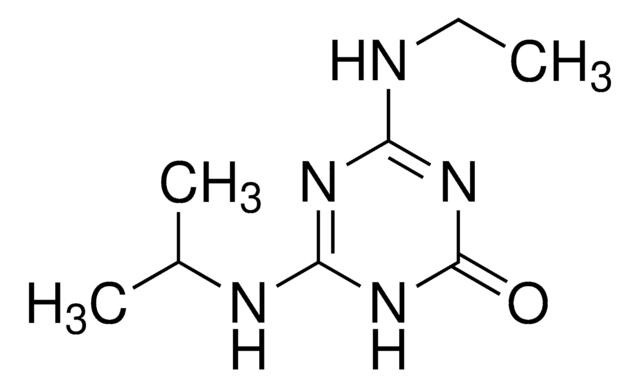41784
Atto 647 maleimide
BioReagent, suitable for fluorescence, ≥90% (coupling to thiols)
Sign Into View Organizational & Contract Pricing
All Photos(1)
About This Item
UNSPSC Code:
12352111
NACRES:
NA.32
Recommended Products
product line
BioReagent
Quality Level
Assay
≥90% (coupling to thiols)
form
solid
manufacturer/tradename
ATTO-TEC GmbH
fluorescence
λex 647 nm; λem 669 nm in 0.1 M phosphate pH 7.0
suitability
suitable for fluorescence
storage temp.
−20°C
Related Categories
Application
Atto 647 belongs to a new generation of fluorescent labels for the red spectral region with high molecular absorption (120.000) and quantum yield (0.20) as well as sufficient stoke′s shift (excitation maximum 645 nm, emission maximum 669 nm). Atto 647 is characterized by a high photostability. The dye is designed for application in the area of life science, e.g. labeling of DNA, RNA or proteins. Atto The dye is very stable under physiological pH-values and in buffers up to pH 8.5. However, it slowly degrades at higher pH. Atto 647 maleimide shows excellent solubility in polar solvents like DMF, DMSO or acetonitrile. After coupling to a substrate the dye moiety is electrically neutral.
Legal Information
This product is for Research use only. In case of intended commercialization, please contact the IP-holder (ATTO-TEC GmbH, Germany) for licensing.
Storage Class Code
11 - Combustible Solids
WGK
WGK 3
Flash Point(F)
Not applicable
Flash Point(C)
Not applicable
Personal Protective Equipment
dust mask type N95 (US), Eyeshields, Gloves
Certificates of Analysis (COA)
Search for Certificates of Analysis (COA) by entering the products Lot/Batch Number. Lot and Batch Numbers can be found on a product’s label following the words ‘Lot’ or ‘Batch’.
Already Own This Product?
Find documentation for the products that you have recently purchased in the Document Library.
Customers Also Viewed
Andreas Bruckbauer et al.
Biophysical journal, 93(9), 3120-3131 (2007-07-17)
We have developed a new method, using a nanopipette, for controlled voltage-driven delivery of individual fluorescently labeled probe molecules to the plasma membrane which we used for single-molecule fluorescence tracking (SMT). The advantages of the method are 1), application of
Duncan Hill et al.
Biomedical microdevices, 13(4), 759-767 (2011-05-12)
This paper presents an overview of development of a novel disposable plastic biochip for multiplexed clinical diagnostic applications. The disposable biochip is manufactured using a low-cost, rapid turn- around injection moulding process and consists of nine parabolic elements on a
Thorben Cordes et al.
Physical chemistry chemical physics : PCCP, 13(14), 6699-6709 (2011-02-12)
Modern fluorescence microscopy applications go along with increasing demands for the employed fluorescent dyes. In this work, we compared antifading formulae utilizing a recently developed reducing and oxidizing system (ROXS) with commercial antifading agents. To systematically test fluorophore performance in
Laura Pastorino et al.
Journal of colloid and interface science, 357(1), 56-62 (2011-02-26)
The protein collagen is the major component of connective tissue and it is involved in many biological functions. Its degradation is at the basis of different pathological processes. The up-regulated expression of matrix metalloproteinases and the down-regulated expression of their
Emmanuel G Guignet et al.
Chemphyschem : a European journal of chemical physics and physical chemistry, 8(8), 1221-1227 (2007-04-17)
Sensitive live-cell fluorescence microscopy and single-molecule imaging are severely limited by rapid photobleaching of fluorescent probes. Herein, we show how to circumvent this problem using a novel, generic labeling strategy. Small nickel-nitrilotriacetate fluorescent probes are reversibly bound to oligohistidine sequences
Our team of scientists has experience in all areas of research including Life Science, Material Science, Chemical Synthesis, Chromatography, Analytical and many others.
Contact Technical Service







